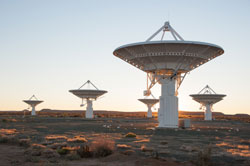
The meeting was also an opportunity for South Africa's Science and Technology Minister Naledi Pandor to appraise her counterparts from Mozambique, Madagascar, Zambia, Mauritius, Kenya, Ghana, Namibia and Botswana on the developments of the SKA project, which is co-hosted by South Africa.
Minister Pandor said construction of the world's largest radio telescope will take place in two phases.
In Phase 1, about 200 parabolic antennas will be erected in South Africa, while Australia -- the other host country -- will have more than 100,000 dipole antennas, which resemble television aerials. A parabolic antenna is an antenna that uses a parabolic reflector, a curved surface with the cross-sectional shape of a parabola to direct radio waves.
In Phase 2, array will extend into other African countries, with the Australian component also being expanded.
"We are confident that the construction of the SKA will start in 2018 and it is predicted that early science observations will be made in 2020," she said.
Minister Pandor congratulated the SKA South Africa team for the on-going construction of the antennas for the MeerKAT telescope, the 64-dish precursor telescope, which will be integrated into the SKA.
Minister Pandor said 32 dishes will be commissioned by 2016, with the full array ready by the middle of 2017.
"We are thrilled that the investment made by the South African government in science is beginning to attract international investment from institutions of the calibre of Germany's Max Planck Society, which has committed €11m to build S-Band receivers - used primarily for pulsar research - and fund all the necessary ancillary equipment for the MeerKAT.
"We hope that through human capital development, innovation, value addition and industrialisation in alignment with STISA [Science, Technology & Innovation Strategy for Africa], we will be able to uplift large sections of Africa's people," the Minister said.
In South Africa, government's contribution to human capital development includes bursaries for undergraduate and postgraduate studies, and the funding of research chairs, including five in the area of radio astronomy.
Since 2006, South Africa has spent over R29 million on bursaries in engineering, astrophysics and astronomy for students from the African partner countries.
At the last SKA African Partner Countries Ministerial Meeting, the ministers adopted the Pretoria Resolution, committing them to finalising the SKA Readiness Strategy and Joint Implementation Plan by the end of March in preparation for hosting the SKA and the African VLBI Network.
The delegates also agreed to work towards a governance framework for radio astronomy initiatives, which will be convened on an annual basis to provide political and strategic leadership to African SKA partner countries.
Last month, South Africa's Deputy President and the ambassadors of SKA member countries from Europe, North America, Asia, Australasia and Africa visited the SKA site in Carnarvon in the Northern Cape.